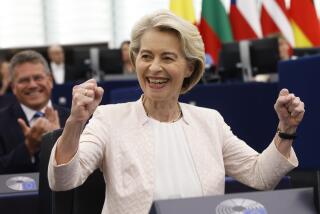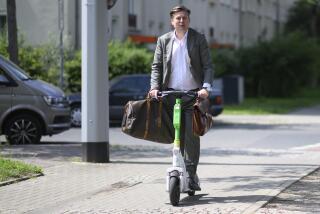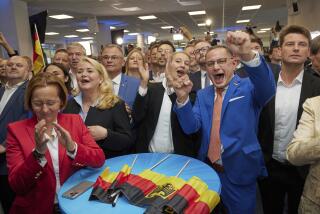Regional Outlook : A Parliament With Potential : You might call it the Walter Mitty of legislatures. It doesn’t do too much, but just think what it <i> could </i> do for Europe . . .
- Share via
STRASBOURG, France — The European Parliament is an easy institution to poke fun at.
Despite its name, it has scarcely any legislative powers. It is the European Community’s version of a fifth wheel--a sort of fourth branch of a three-branch government. Its role is largely to provide advice that the EC’s real decision-making bodies are mostly free to ignore.
Yet Parliament has a huge budget--nearly $800 million a year, about half of the U.S. Congress’ $1.5 billion. It needs nearly 40% of the total just to pay for translation between the 12 EC countries’ nine languages.
Parliament has no single home. Most of its permanent staff is housed in Luxembourg. But its 518 members have offices in Brussels, where its committees meet three weeks each month.
The fourth week, however, the members and most of the staff pack up and move to this Alsatian town 250 miles away for Parliament’s monthly plenary sessions. That does wonders for Strasbourg’s hotel and restaurant business, but not for parliamentary efficiency. Transportation alone eats up another 15% of the annual budget.
Yet for all its peccadilloes, the European Parliament is not always an institution to be trifled with. It has quietly managed to modify some EC policies, particularly in the environmental sphere.
And its potential--to evolve into the legislature of a federal European government--is enormous. Although national EC governments may never yield it such powers as that of declaring war, the European Parliament may one day at least be given the authority, now lacking, to initiate legislation.
Already it is the world’s only elected supranational legislative body. It brings together such diverse members as a survivor of the Auschwitz concentration camp (Simone Veil of France) and a former lieutenant in Hitler’s SS (Franz Schoenhuber of Germany).
“It is extraordinary,” says Ghijs de Vries, a Dutch member of Parliament, “that 12 countries--countries that were at war for centuries, that fought two wars against each other this century, that still harbor deep prejudices against each other--have agreed to be bound by legislation passed not by unanimous vote but by majority vote.”
Not that De Vries is satisfied with Parliament the way it is. Hardly anyone is, not even its president, Egon Klepsch, a centrist German politician who has served for 20 years. Klepsch believes Parliament needs such standard legislative tools as the power to ratify treaties and to confirm the appointments of the EC’s chief executive officers.
“Parliament is the only European Community institution directly elected by the people,” says Klepsch. “Otherwise, the democratic structures of the Community are lacking. The more power the Community accumulates, the more important it is for us to play a major role.”
David Martin, who represents Scotland, says Parliament must learn to use its existing powers before it can expect to be given more. That won’t happen, he says, unless Parliament cleans up its act. Last year, for example, it produced its advice for the EC’s delegation to the global environmental summit in Rio de Janeiro only after the summit was over.
The institution is also going to have to settle on a single home--probably Brussels, the location of most other EC offices--even if that means forcing the French government to give up its campaign to keep Parliament in Strasbourg. “If Parliament can’t even decide where it’s going to meet, how can anybody take us seriously?” Martin wonders.
Asked where they have had an impact on EC policy, members of Parliament cite mostly changes they have made at the margins. They tightened EC automobile exhaust standards. They helped toughen EC standards on carbon dioxide emissions. They were instrumental in banning growth hormones in EC beef.
For the most part, however, Parliament has occupied itself with matters over which it has no control: everything from relations with Vietnam to cyclones in Bangladesh.
“Parliament has devoted too little time to its legislative role and too much to pontificating about the world’s problems,” observes Stanley Crossick, a veteran Brussels consultant on EC matters.
More authority is on the way via the Maastricht Treaty on European political and monetary union, named for the Dutch town where it was initialed by EC leaders in 1991. The Maastricht Treaty would considerably expand Parliament’s powers--not to initiate legislation but at least to block measures it opposes in a range of areas including environment, economic development, industrial policy, education and social policy. First, however, the treaty must be ratified by the final two EC members, Denmark and Great Britain.
For now, Parliament rests uncomfortably between the EC’s two institutions of real power: the executive Commission and the legislative Council. (The final star in the EC constellation is the European Court of Justice, which arbitrates disputes between EC institutions.)
Only the Commission, whose 17 members are appointed by the EC’s member nations, has the power to propose legislation. Only the Council--one minister from each of the EC’s 12 national governments--has authority to turn legislative proposals into law.
Between initiation and enactment, proposals bounce like pinballs between Commission and Council and Parliament. Parliament’s role is mostly to offer its opinion--and more often than not, its opinion is ignored.
Something like a child who gets his way by threatening to hold his breath, Parliament has learned to withhold its formal opinion as a way of forcing the Commission and Council to compromise with it. That is how, for example, it forced U.S.-style auto exhaust standards when the Commission proposed something less stringent.
Parliament has grown sufficiently influential that it has begun to attract the European equivalent of the lobbyists who prowl the halls of the U.S. Congress. One is Nicholas Phillips, who runs his own consulting firm in Brussels and makes the monthly pilgrimage to Strasbourg when Parliament is in session.
Phillips says Eurolobbyists keep a lower profile than their American counterparts. “You wouldn’t get anywhere in this institution by banging your fist on the table or waving around large sums of money,” he says.
One reason is that European parliamentarians, unlike members of the U.S. Congress, don’t solicit massive campaign contributions. EC nations strictly limit campaign spending, and most of the money is raised by the parties, not individual candidates.
Nor are campaigns as fierce as in the United States. Except in Great Britain, voters choose between parties, not individual candidates, and each party’s delegation to Parliament is proportional to its share of the national vote.
Voter turnout is low by European standards--typically about 20 percentage points lower than in national elections--but high by American standards. About 57% of eligible voters cast ballots in 1989, compared with about 45% in typical U.S. congressional elections when there is not also a presidential election.
Parliament has been an elected body only since 1979; before that, it was composed of delegates from national EC parliaments. Now its members hold five-year terms. With next year’s elections, Parliament’s fourth, the institution will grow from 518 members to 567, mostly to provide representation for Germany’s newly acquired states in the former East Germany.
It’s not so much the pay that attracts politicians to run for Parliament as the perks. Salaries are equal to those in national legislatures, from about $2,750 a month for Greek delegates to $6,700 for Italians.
On top of that, members receive about $240 per day for food and lodging when they are attending official meetings. They are paid a generous travel allowance and a stipend large enough to maintain a personal staff of two or three people. And in return they can get by with very little work, if they so choose.
Parliament has attracted a mixed bag of members: 10% up-and-coming hotshots and 10% over-the-hill free-riders, by De Vries’ estimate, with the rest willing to go along with the leadership and not rock the boat.
A few, including Britain’s 35-year-old Alan Donnelly, could have been elected to their national parliaments but chose the European Parliament instead. Donnelly, a Labor Party delegate from a depressed area of northern England, says the EC is better positioned than the British government to turn the British economy around.
The European Parliament has also attracted no less a political figure than former French President Valery Giscard d’Estaing, who is using his service in Strasbourg to keep his name before the French public as he ponders another run for the presidency in 1995. Three former Italian prime ministers and one former Belgian prime minister are other delegates.
Parliament’s oldest member is also the one with the most impressive pedigree: Otto von Hapsburg, who would be the emperor of Austria-Hungary if there was still such a place. Fittingly, with the end of the Cold War, Von Hapsburg became chairman of Parliament’s delegation to Hungary.
Europe’s Legislature
* Name: European Parliament.
* Age: 13 years.
* Locations: Strasbourg, France (monthly sessions); Brussels (committee meetings); Luxembourg (most staff).
* Powers: Largely advisory to European Community
* Method of choosing members: Direct elections since 1979.
* Next elections: July, 1994
* Length of terms: Five years.
* Membership: 518 from the 12 European Community countries, scheduled to rise next year to 567. Members by country:
Current Next year Belgium 24 25 Britain 81 87 Denmark 16 16 France 81 87 Germany 81 99 Greece 24 25 Ireland 15 15 Italy 81 87 Luxembourg 6 6 Netherlands 25 31 Portugal 24 25 Spain 60 64
Members by party Socialists: 180 European People’s Party (mostly Christian Democrats): 162 Liberals: 45 Leftists (mostly former Communists): 41 Greens: 28 Rightists: 14 Others: 48. Members by gender Men: 417 (80.5%) Women: 101 (19.5%)
More to Read
Sign up for Essential California
The most important California stories and recommendations in your inbox every morning.
You may occasionally receive promotional content from the Los Angeles Times.













